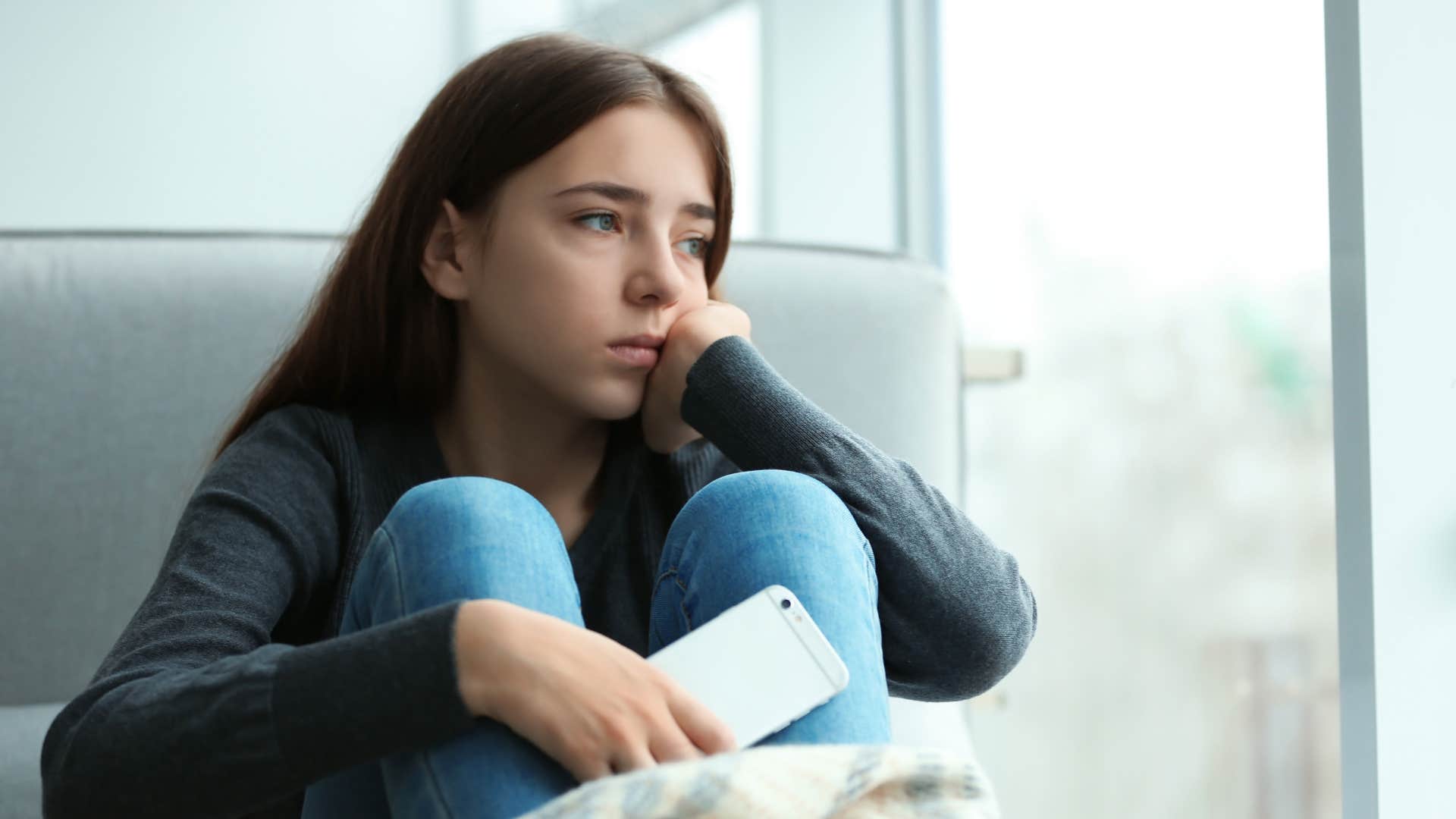People Who Don't Reply To Texts Even When They're On Their Phone 24/7 Usually Have These 11 Reasons
There is often more to someone's silence than they let on.
 Dean Drobot / Shutterstock
Dean Drobot / Shutterstock We have never been more connected to each other than we are in this new modern age, where everyone has a cellphone in their pocket to chat with anyone at any time. So, it can seem insulting when your message is left unread, especially if you know that the other person is practically glued to their phone. Their attachment to their phones is so potent that even when you are hanging out with them in person, they take it out like a third friend in the group.
While that is a more extreme case, it can still hurt when you start to feel people who you're close to silently drift away from you, the less they choose to communicate. Interactions gradually disappear over time, and eventually, you're left wondering what happened. When we are ignored, we quickly begin to think that it has something to do with us, but there might actually be something else going on.
People who don't reply to texts even when they're on their phone 24/7 usually have these 11 reasons
1. They get texting anxiety
 fizkes | Shutterstock
fizkes | Shutterstock
Texting anxiety is a very real phenomenon that happens when a person feels anxious when they receive or send a message. According to a survey published by the World Economic Forum, 31% of people reported that texting is a daily source of stress for them. They overanalyze every word or emoji that they send and think of all of the possible responses that the other person would say back to them, so they are better prepared for the next reply.
To most people, this might seem excessive, but it stems from past experiences where they have had misunderstandings with other people through messaging. With many receiving harsh or even sometimes rude responses that hurt their self-esteem. Sending them a message that tells them not to rush to reply can help put their anxiety at ease, especially if what you have to say to them is not an emergency.
2. They're struggling with their mental health
 New Africa | Shutterstock
New Africa | Shutterstock
People will use their cellphones as a way to escape their problems in life. According to a study in Computers in Human Behavior, people with depression will use mobile phones more intensively to tap into their social networks for help with coping. However, this has a downside to it because stress combined with high texting often leads to lower emotional well-being and mental health issues.
Mental health issues can cause people to isolate themselves even from those whom they love and speak to every day. If you're aware that someone you know struggles with this, then it's best to give them some space, and when they're feeling better, they will contact you. All you have to do is let them know that you're there if they need you.
3. They're working
 Wasana Kunpol | Shutterstock
Wasana Kunpol | Shutterstock
Most of us would love nothing more than to text all day long, but many of us work and can't respond right away. It can get quite overwhelming when you are working and your phone won't stop buzzing. Sometimes it's not even an emergency but simply a meme or notification from a third-party app that they are using. It's best to allow people to reply to you when they have the spare time to do so. That way, they can be free from distractions and do their jobs properly. Once they are in a calmer place, they will message you.
While there is nothing wrong with texting someone during work hours, the problem comes when people in your life expect you to reply to them immediately. A survey by HTC found that during work hours, people expected a response to text messages within 1 hour from family members and friends, while romantic partners expected a reply within 5 minutes. Even if they're on their phone 24/7, expecting a reply is a form of entitlement and can be a bit controlling if you put a time limit on their replies.
4. They see your texts as low priority
 voronaman | Shutterstock
voronaman | Shutterstock
There are many reasons why someone would see your text as a low priority for them. If your message doesn't seem time sensitive or compelling enough to them, then they may leave it unread until later. This is the best outcome because at least you know that they will reply to you later on in the day, but the worst outcome has more to do with incompatibility.
They may feel like the two of you don't see eye to eye and will stop messaging you altogether because they feel like the relationship has gone as far as it will ever go. This can be damaging to the person on the receiving end because it feels like a personal rejection. To the avoidant messenger, this is the most polite way of telling you that it isn't going to work out.
5. They thought they replied already
 Pheelings media | Shutterstock
Pheelings media | Shutterstock
At some point, we've all thought that we replied to someone only to find out later that we never actually sent the text message. It's an awkward situation and a little bit embarrassing because while you are sitting there waiting for a reply, your friend is also waiting for you. Suddenly, both of you are upset because you feel like neither of you cares about the other.
It's a small reminder of how much we rely on technology to help us maintain our relationships. One innocent mistake can cause massive miscommunication and permanently alter how we view each other. A quick follow-up or explanation can go a long way here, and maybe both of you will laugh about it in the end.
6. They're known for procrastination
 Prostock-studio | Shutterstock
Prostock-studio | Shutterstock
People who are chronic procrastinators tend to delay everything in their lives, so messaging you back is no different. Some may call it laziness, but it could just be that they are inconsistent communicators, especially if they are prone to do this in other aspects of their lives. The best way to handle these types of people is to set boundaries with the way the two of you communicate and remind them that if they really cared about your connection, then the least they can do is reply every now and again.
If they're someone who has their phone with them 24/7 and they are notorious procrastinators, then that could be a recipe for disaster. A study published in the Journal of Affective Disorders found that excessive smartphone use can impair time management and self-control, which leads to the procrastination of various tasks. So, the phone itself could be making their procrastination worse, which is why they never got back to you.
7. They're experiencing social burnout
 ElenaYakimova | Shutterstock
ElenaYakimova | Shutterstock
A person who spends all day on their phone and messaging multiple people at once will eventually face the inevitable burnout. Each conversation depletes their energy to the point that when they finally get to your message, they simply don't reply. Most of the time, it's not about you per se, but about their multitasking causing them constant stress as their social meter drains.
There is such a thing as getting instant message fatigue, which can leave you drained after socializing frequently on your phone. A study published by Emerald Insight found that communication and social overload through instant messaging platforms led to an increase in technostress, which caused people to discontinue the usage even more. They may feel pressure to continue messaging everyone and even feel guilty if they forget to reply to you. The best route is to be patient and not take it so personally when they don't message you back.
8. They want to avoid conflict
 Dikushin Dmitry | Shutterstock
Dikushin Dmitry | Shutterstock
If the two of you have recently gotten into a disagreement with each other, then they might not want to text you back for fear of confrontation. Maybe the issue wasn't that big of a deal to you, but to them, it was a serious offense, and they don't know how to come back from it. In situations like this, giving them a gentle nudge by letting them know that you're open to continuing communication can help reassure them.
People with avoidant attachment styles will go out of their way to avoid conflict as a coping mechanism. According to a study published by Frontiers, avoidant people often perceive conflict as a threat and may withdraw or avoid addressing the issue directly. This rarely benefits them as it can lead to unresolved tensions, and the relationship will suffer over time.
9. They're not as emotionally invested as you are
 Studio Romantic | Shutterstock
Studio Romantic | Shutterstock
This is a tough pill to swallow, but just because someone's investment in the relationship isn't the same as yours doesn't mean that it is any less valid. People have the right to choose who they want to have a close relationship with. The easiest way to notice this is if their communication feels distant or inconsistent. There's only one thing you can do in this situation, and that is to hold your head up high, knowing you did everything that you could do to save the connection.
When they don't feel the same sentiment, it could be because they find it difficult to tell you that they are not as emotionally invested in the relationship as you are. A study published by the American Psychological Association found that people text for various different reasons, one of which includes expressing emotions that they find difficult to convey verbally.
10. They're distracted by something else
 Prostock-studio | Shutterstock
Prostock-studio | Shutterstock
When someone's mind is juggling different things at once, responding to a text might not feel as urgent to them. They might plan on texting you later, but they're so busy that they get sidetracked by something else. The distractions don't have to come from the phone itself, but from what is happening around them. Giving the person you know the benefit of the doubt in this situation is the best course of action.
Multitasking can be exhausting after all. It’s not that they don't want to talk to you; it's just that other things demand their immediate attention. This could be their children or the errands that they need to do. We all have lives outside of our social circles, so when one of us gets busy then we know we would want them to cut us some slack.
11. They have poor communication skills
 Ekateryna Zubal | Shutterstock
Ekateryna Zubal | Shutterstock
People who don't reply to texts despite being constantly on their phones tend to struggle with communication skills. You might notice that when you're face-to-face with them, they rarely have anything to say but will type away at their mini keyboards. Texting offers people time to respond appropriately rather than an in-person conversation that puts them on the spot.
Poor communication skills can come from deeper psychological issues like anxiety or low confidence. When someone feels insecure about their communication abilities, they might feel the need to avoid interacting with others for fear of making mistakes or being judged. This is just one of the many reasons people don't reply to texts.
Sylvia Ojeda is an author who has over a decade of experience writing novels and screenplays. She covers self-help, relationships, culture, and human interest topics.

